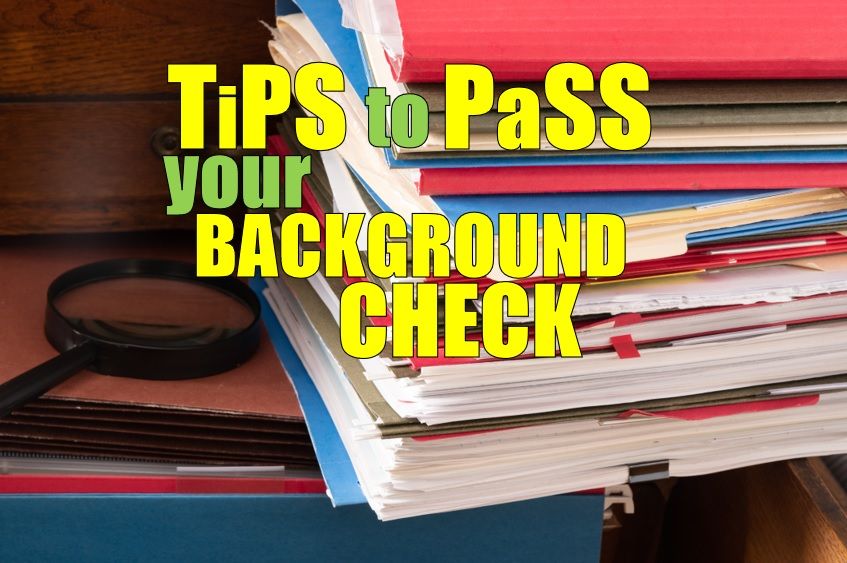Craig Johnson
Tips to Help You Pass a Background Check
We explain what it means to pass a background check and how to tilt the odds in your favor when you face a background check.

Background checks are increasingly used in employment and housing, and people naturally wonder what items on their background report might sink their chances of landing a great job or moving into a new place. Fortunately, when background checks are used as a screening tool, the process is more nuanced than "pass or fail." Screeners are encouraged by law to evaluate candidates as multifaceted individuals.
Even a criminal conviction is not an automatic disqualification in most employment and housing background checks, or at least by law it shouldn't be. (The background check to buy a firearm is another matter.)
Here's what you should know about passing a background check, including helpful tips for handling an interview. In this article we will cover:
- Hurdles you might face in a background check
- Why many employers run background checks
- Tips for passing a background check
- How common are background checks for jobs?
- What's included in a background check
The Value of Background Checks
Uncovering criminal offenses is only one of the purposes of a background check. Comparing a background report alongside a tenant or job application is a gauge of general honesty. This is not only a chance to look for arrests and convictions but also for accuracy in education history and job locations.
Search Anyone FreeAstute screeners will check that the background report matches the application. A sprinkling of inaccuracies in one's job application will, at best, be seen as a sign of laziness (you didn't bother looking up names and dates and instead went by memory) or, at worst, willful misrepresentation.
"A thorough background check can identify individuals who have misrepresented their education or professional credentials [and] those who have provided false references," writes the HR Daily Advisor. They stress that background checks aren't simply for identifying people who have committed a crime.
Honesty is the best policy. While it is tempting to omit unflattering things when filling out an application, a background report will scour public records and dig up facts in seconds. You should be truthful on your application because if the fudging is exposed later, explaining a fact will be easier than explaining a lie.
A criminal offense coming to light is one of the hurdles a person might face when undergoing a background check.
Potential Hurdles to Passing a Background Check
When people worry about passing a background check, it's often because they have a criminal record. That's understandable. Even a relatively minor misdemeanor conviction stays on your record two to seven years, generally.
People fear that a criminal record appearing during their background check will mean automatic rejection, but it's against the law for employers to do that. They can't routinely trash all applicants with a criminal conviction unless the crime is related to the job duties, per the Civil Rights Act of 1964.
“Employee drug testing is currently legal in all 50 states.”
Job-specific history may matter more than general history. For instance, an employer who is screening candidates for a high-end retail job will probably care more about a shoplifting arrest than a failure to complete college. Therefore, whether you pass or fail a background check often depends on the employer's focus and the duties of the job.
A criminal record, even past incarceration, does not disqualify a person from most jobs in the federal government. The government recognizes that people who have paid their debt to society deserve a chance at gainful employment.
Why Many Employers Run Background Checks
Companies conduct background checks on prospective employees and volunteers for many reasons. Often it is for internal security; the job may require handling cash or costly merchandise. Some employers have external concerns; they don't want to fill a public-facing position with someone who could get the whole organization in trouble. Schools, for obvious reasons, won't hire someone who's registered as a sex offender.
With the convenience of online background checks came more employers of all types running checks on job candidates, but traditionally, you are more likely to face a background check when seeking employment in the following fields.
- Education: Teachers, administrators, professors
- Home contractors: Construction workers, plumbers, electricians
- Finance: Real estate professionals, accountants, bankers, insurance agents, financial planners
- Civil service: Administration, police officer, corrections officer
The main reasons an employer will require a background check are for avoiding theft, public safety, liability, legal requirements, and customer relations.
“Be truthful on your application because explaining a fact later will be easier than explaining a lie.”
Tips for Passing a Background Check
Because background checks might pull from many sources and will be evaluated by specific people for a specific purpose, no one can guarantee that you will pass. That said, here are four tips for managing a background check to increase your odds of success.
1. Fill out the application honestly.
Don't fudge the facts on your application. The truth will come out later, and acting surprised when it does won't impress the screener. After all, if you seemingly can't get your own biographical details straight, how sharp would you be on the job?
2. Expect them to ask.
Speaking of surprises, don't be thrown when an interviewer asks about a criminal record or other rough spot on your background report. Prepare a brief response beforehand, and rehearse it. When the question arises, look the interviewer in the eye and explain things.
3. Screen yourself first.
Pull a background report on yourself at PeopleWhiz to see what prospective employers and landlords will see. There are many good reasons to background-check yourself.
4. Prepare short answers to the most likely questions.
Prepare your responses to questions about an erratic education (changing schools, dropping out), a nomadic address history (never in one place for long), months of apparent downtime in your resume, or anything else that seems likely to come up in an interview. Put yourself in the interviewer's shoes: What would you ask?
5. Dispute errors on your credit reports.
If you think you might face a credit check along with your background check, review your three credit reports ahead of time. Focus on any negative marks, and dispute those that seem to have come from an error or a misunderstanding. Reports are absolutely free when you download them via the only official government-backed site, AnnualCreditReport.com.

How Common Are Background Checks for Employment?
According to a national survey of human resources departments, 83% of employers conduct some type of background screening for their full-time positions.¹ Among those respondents who conduct background checks, criminal history is almost always included (96%). Social media activity, on the other hand, was only screened by 33% of the respondents who run background checks. Most surprising in the survey was that only one in five employers (22%) routinely verified a candidate's education.
Your Credit Reports Are Not Part of a Typical Background Check
When you're applying for a job, don't worry that just anyone can stick their nose in your finances. Background checks pull from public records, but your credit reports and credit scores are private. A credit check is a distinct, separate investigation from a background check.
The federal Fair Credit Reporting Act promotes the accuracy of our financial information and how and when it can be used. To access your financial information, a prospective employer must have a "permissible purpose" under the FCRA. For example, the job is in banking or at a casino.
Further, the employer must:
- Get your written permission
- Tell you how they want to use your credit report
- Not misuse your information
- Give you a copy of your credit report if the employer decides not to hire or fires you
- Give you an opportunity to dispute the information contained within your credit report before rejecting you
Credit checks are more likely to be requested by landlords than employers. Before entering into a lease with you, the owner or manager of the property naturally wants to see how you manage money. Poor credit won't automatically bar you from all apartments. "Many landlords charge a security deposit based on a tenant’s background and credit check," says Apartments.com, "so if the tenant doesn’t meet all of your requirements but you still choose to rent to them, you can require more money up front or a higher security deposit."
So now that you know credit reports are separate from background checks, you might wonder what types of inquiries and reports a background check generally includes.
What Is Included in an Employment Background Check
Employers who conduct background checks will use one or possibly several sources, and it varies by employer and the job opening. Alongside the job application form, the primary tool to screen candidates is a background report. Drawn from public records, a background report shows a person's legal name, address, marital status, arrests, and more.
Employment history might be verified and references could be contacted as part of an employment background check. Further, work authorization will be confirmed, such as with an Employment Authorization Document (EAD).
In addition to a background check, an employer might make a case for screening a candidate's financial history. The law requires that the employer obtain permission from the candidate first and handle the information a certain way (see above).
A third of human resource departments in a national survey said they routinely review social media activity as part of their background check. In contrast to that somewhat low number, a CareerBuilder survey found that social media screening was more widely practiced, with 70% looking at applicants' profiles. Viewing social media can answer many of the questions an employer is legally forbidden from asking in an interview. Because of this, more than 20 U.S. states now bar employers from asking applicants to pull up their social media pages during an interview or to share their usernames and passwords.
It is currently legal in all 50 states to perform drug test screening on employees. A person's urine, hair, saliva, or blood might be tested. To drug-test job candidates, the employer must get preapproval from the candidate. As for current employees, the U.S. Supreme Court has held that they gave consent when they accepted the job.
Wrap-Up
Whether the next company you seek employment with will use one, two, or all of these data sources in a background check is impossible to predict. Also, cities and states have their own rules about which employers can access background information on job candidates and how they can use it. Just remember that everyone else applying for that job or that apartment faces the same background check you do. You can still shine through as the strongest candidate regardless of any rough spots on your background check.
Search Anyone Free



